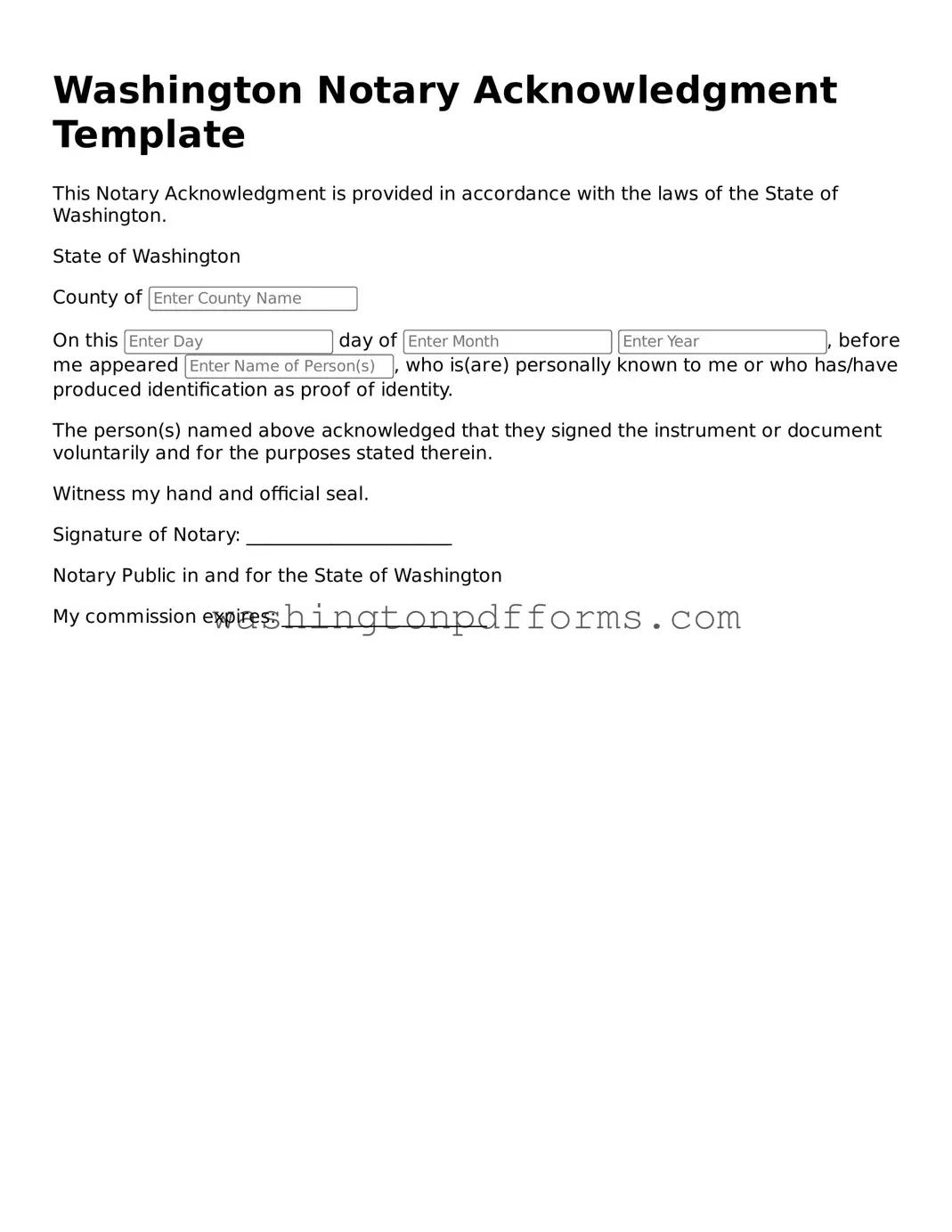Attorney-Approved Washington Notary Acknowledgement Template
In the realm of legal documentation, the Washington Notary Acknowledgment form plays a crucial role in verifying the authenticity of signatures on important documents. This form serves as a formal declaration by a notary public, affirming that they have witnessed the signing of a document by the individual named within. It is essential for various legal processes, including property transactions, wills, and other agreements, where proof of identity and intent is vital. The form requires specific information, such as the name of the signer, the date of the acknowledgment, and the notary's signature and seal. By using this form, individuals can ensure that their documents hold up in court and are recognized as valid by all parties involved. Understanding the nuances of the Washington Notary Acknowledgment form is not just beneficial; it is often necessary to navigate the complexities of legal affairs effectively.
Common mistakes
When filling out the Washington Notary Acknowledgment form, individuals often make several common mistakes that can lead to delays or complications in the notarization process. One frequent error is the omission of the signer's name. It is crucial to ensure that the name matches the identification presented. If the name is incomplete or incorrect, the notary may refuse to acknowledge the signature, rendering the document invalid.
Another common mistake involves the date. The acknowledgment form requires the date on which the notarization takes place. If the date is left blank or filled out incorrectly, it can cause confusion regarding when the document was signed. This oversight can affect the legal validity of the document, especially if it is time-sensitive.
People also frequently overlook the requirement for the notary's signature and seal. The notary must sign and affix their official seal to the form for it to be considered valid. If either of these elements is missing, the acknowledgment will not hold up in legal contexts. This mistake can be easily avoided by double-checking that all required signatures and seals are present.
Lastly, individuals sometimes fail to provide the correct type of identification for the signer. Washington law stipulates that the notary must verify the identity of the individual signing the document. Acceptable forms of ID include a driver's license or a state-issued identification card. Using an expired or inappropriate form of ID can lead to the notary refusing to proceed with the acknowledgment, which can cause significant delays in the process.
Similar forms
The Notary Acknowledgment form is an important document used in various legal processes. Several other documents share similarities with it. Here’s a list of nine documents that are comparable to the Notary Acknowledgment form:
- Affidavit: Like a Notary Acknowledgment, an affidavit is a written statement confirmed by oath or affirmation. It often requires a notary's signature to validate the identity of the signer.
- Power of Attorney: This document grants someone the authority to act on another's behalf. It often includes a notary acknowledgment to verify the principal's identity and intent.
- Deed: A deed transfers ownership of property. Notarization is typically required to ensure that the signatures are authentic and that the parties understand the transaction.
- Will: A will outlines how a person's assets will be distributed after death. Some states require notarization to validate the will and confirm the testator's identity.
- Contract: Many contracts need notarization to ensure that all parties are aware of the agreement and have signed willingly. This adds a layer of legal protection.
- Loan Documents: When securing a loan, borrowers often sign various documents that require notarization. This helps confirm the identity of the borrower and the legitimacy of the agreement.
- Real Estate Closing Documents: At closing, various documents are signed and notarized to finalize a property transaction. This ensures that all parties are properly identified and agree to the terms.
- California DMV DL 44 Form: This form is essential for applying for or renewing a driver's license in California, assisting with accurate personal information submission, and can be found at smarttemplates.net/.
- Consent Forms: These forms may require notarization to confirm that the individual giving consent is doing so willingly and understands the implications.
- Certification of Trust: This document provides evidence of a trust's existence and details its terms. Notarization helps verify the identity of the trustee and the authenticity of the document.
Some Other Washington Templates
Washington State Articles of Incorporation - The Articles specify the number of shares the corporation is authorized to issue.
For those looking to understand the specifics of their tax filings better, the Sample Tax Return Transcript offers a detailed overview of important tax information. This can be particularly useful for taxpayers aiming to verify their income when applying for loans or other financial benefits. For a closer look at what a Sample Tax Return Transcript looks like, you can visit https://topformsonline.com/sample-tax-return-transcript/, which provides helpful insights into the document's contents.
Financial Power of Attorney Washington State - You may want to discuss your wishes with your agent ahead of time for clarity.
How to Make a Nda Legal - NDAs can cover oral and written information, ensuring comprehensive protection.
